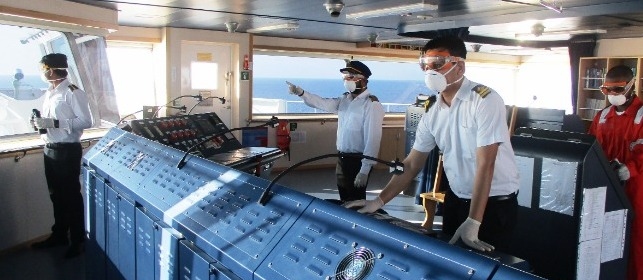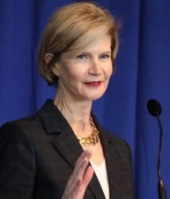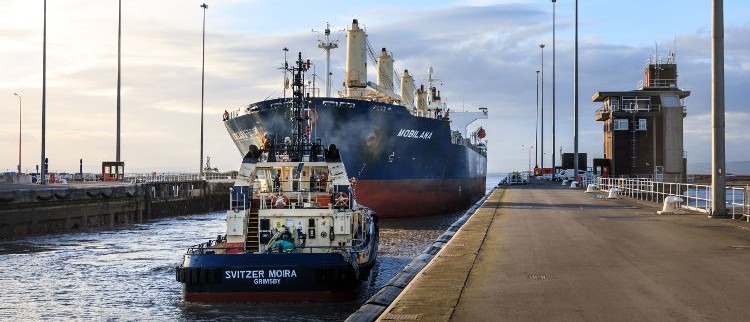|

Shipping Alliance Calls for Solution to Crew Change Shutdown
April 15, 2020 - An alliance of leading maritime companies is calling on governments around the world to make interim arrangements for crew changes, which have been effectively halted in many localities due to the COVID-19 lockdown. At present, over 100,000 seafarers are effectively stuck at sea because the global patchwork of coronavirus policies prevent them from entering countries, transiting through non-destination countries or finding flights on which to return home. This has implications for seafarer wellbeing, safety and the operational integrity of the supply chain, the alliance warns.
The alliance represents 1,500 vessels and 70,000 seafarers, and it includes leading names like D/S Norden, Grieg Star, Reederei Nord, Dynacom, V.Group, Wilhelmsen Ships Service, Pacific Carriers Limited (PCL), Magsaysay, Augustea, Columbia Ship Management, Inchcape Shipping Services and Synergy Group. The group's proposals have support from the International Chamber of Shipping and the International Transport Workers’ Federation.
“We understand Covid-19 is a black swan event. But measures aimed at protecting society were never intended to prevent key workers from carrying out tasks essential to the ongoing wellbeing of society. These policies were also not intended to be detrimental to the welfare of key workers such as seafarers," said Capt. Rajesh Unni, head of Synergy Group. “Our collective aim as responsible owners and managers employing tens of thousands of seafarers is to pursue every means possible to get crew back to their families.”
“Prolonged periods of service onboard will ultimately result in a significant increase in mental wellbeing issues among the seafaring community,” said V.Group CEO Graham Westgarth. “We should also be aware of the negative impact it will have on their families. Ultimately, such a situation can only jeopardise the safety of the individuals and potentially the vessels they sail on."
Over 1.6 million seafarers keep the world’s merchant fleet running, and about 100,000 of them need to rotate on and off every month in accordance with employment contracts and international conventions, including the Maritime Labour Convention (MLC). The alliance's members believe that collective crew changes at a small number of identified ports are a feasible short-term goal (with port state assistance). The proposed ports for these changes include Singapore, Houston, Rotterdam, Gibraltar, Jebel Ali, Fujairah, Hong Kong and Shanghai.
The alliance believes that collective crew changes can be managed at minimal risk. “Matters such as access to airlines and airports and immigration clearances are political decisions,” alliance members said a joint statement. “The shipping industry and seafarers are now relying on the world’s politicians to respect their human rights and protect their welfare in these difficult times. Seafarers are key workers and they should be classified as such and their plight addressed with all expediency.”
Keith Obeyesekera, the managing director of Reederei Nord B.V., said that governments should recognize seafaring as an essential service and give seafarers special status for travel and visa issuance. “Currently, in some instances, crew members requiring urgent medical attention have not been allowed ashore, or have not been allowed to sign off in their own home countries," he said.
SOURCE: The Maritime Executive |
Commissioner Dye Leading FMC Initiative to Address Urgent COVID-19 Supply Chain Impacts
 March 31, 2020 - The Federal Maritime Commission today issued an order authorizing Commissioner Rebecca Dye to identify operational solutions to cargo delivery system challenges related to Coronavirus-19. March 31, 2020 - The Federal Maritime Commission today issued an order authorizing Commissioner Rebecca Dye to identify operational solutions to cargo delivery system challenges related to Coronavirus-19.
The Order notes that “Recent global events have only highlighted the economic urgency of responsive port and terminal operations to the effectiveness of the United States international freight delivery system. Given the Commission’s mandate to ensure an efficient and economic transportation system for ocean commerce, the Commission has a clear and compelling responsibility to actively respond to current challenges impacting the global supply chain and the American economy. Accordingly, the Commission has determined there is a compelling need to convene new Supply Chain Innovation Teams to address these challenges.”
In addition to authorizing Commissioner Dye as the Investigating Officer for “Fact Finding No. 29 International Ocean Transportation Supply Chain Engagement”, the Order allows her to form one or more FMC Supply Chain Innovation Teams to support the efforts.
“The United States depends on reliable international ocean freight delivery to support the economic security of our country. The maritime supply chain extends upstream and downstream from the ports and closely located logistics centers to American exporters and importers and keeping the system functioning is a priority of national importance. This initiative is an effort by the Commission to do everything we can to eliminate pressing problems in the freight delivery system,” said Commissioner Dye.
Commissioner Dye will engage key executives to participate on the Innovation Teams. These industry leaders will represent all facets of the ocean cargo system including public port authorities, marine terminal operators, beneficial cargo owners, ocean transportation intermediaries, liner shipping companies, drayage trucking companies, longshore labor representatives, rail officials, and chassis providers.
Commissioner Dye will commence her work by interviewing port directors to determine what steps they can identify to mitigate critical supply chain challenges.
“Small and medium-sized shippers are especially affected by a lack of cargo storage space and are running out of options of where to send shipments once offloaded and I applaud this contribution. The Pacific Northwest Seaport Alliance has identified sites in their complex that can be used to stage cargo and containers off terminals. I applaud their initiative. We are calling on everyone engaged in moving ocean cargo to do what they can in this effort,” said Commissioner Dye.
Individuals wishing to provide information to Commissioner Dye may do so by writing to [email protected].
SOURCE: Federal Maritime Commission |
G2 Ocean Appoints Sim Keat Lim as the New Vice President Pacific
 Feb. 28, 2020 - G2 Ocean has appointed Sim Keat (SK) Lim as the new Vice President Pacific. He will responsible for leading G2 Ocean’s Pacific trades and further expanding the company’s reach of services in Asia. Feb. 28, 2020 - G2 Ocean has appointed Sim Keat (SK) Lim as the new Vice President Pacific. He will responsible for leading G2 Ocean’s Pacific trades and further expanding the company’s reach of services in Asia.
Lim replaces Simon Baker, who has been assigned to develop new business opportunities in Africa and India and is moving to South Africa.
Formerly, Lim served as Global Shipping Head of Jakarta-based Asia Pulp and Paper, one of the largest pulp and paper companies in the world.
“SK has in-depth and updated knowledge of the pulp and paper market, particularly in Asia. He has tackled many similar challenges in previous roles, and we are confident in his ability to shape our business, including launching and scaling new markets,” said Arthur English, CEO of G2 Ocean.
Lim has a double master’s degree in Business Administration, specializing in Shipping, Offshore and Finance from both Nanyang Business School and BI Norwegian School of Management.
About G2 Ocean
Headquartered in Bergen, Norway, G2 Ocean is a joint venture of two of the world’s largest open hatch ship-owning companies; Gearbulk and Grieg Star. Since the launch in 2017, G2 Ocean has become the largest deep-sea breakbulk carrier in the world, and also operates a substantial fleet of conventional bulk vessels.
G2 Ocean operates a fleet of approximately 125 vessels; the world’s largest fleet of open hatch gantry crane and jib crane vessels with box-shaped holds to maximise stowage and minimise cargo handling.
SOURCE: G2 Ocean |
Shipping Decarbonization Hinges on Owners of Cargo, Not Ships
The single most important vessel-supply question for the coming decades is: Will the ocean shipping industry decarbonize on a global scale?

By Greg Miller for Freight Waves
Feb. 7, 2020 - The single most important vessel-supply question for the coming decades is: Will the ocean shipping industry decarbonize on a global scale?
Even those who view carbon reduction with contempt and are entirely focused on their own bank accounts take this question very seriously, given the enormous sums to be gained or lost. What’s at stake is nothing less than the long-term supply-demand balance of the world’s shipping network.
Decarbonization would reduce the number of vessels at sea, revolutionize ship designs, and force ocean freight rates higher to cover the added cost. For this to happen, ship owners must be denied the capital to finance new carbon-emitting ships, and they must be forced to decarbonize via binding International Maritime Organization (IMO) regulations.
None of that is possible unless it’s supported by the cargo side: the world’s largest ocean shippers of oil, gas, ore, coal and grain, as well as the governments of the countries that have the most to gain from ocean trade, whether of bulk commodities or containerized goods — particularly countries in Asia.
The pro-decarbonization game plan was laid out in detail at the Hellenic-American/Norwegian-American Chambers of Commerce (HACC/NACC) Joint Shipping Conference in New York on Tuesday. Advocates claimed that not only ship finance but also cargo interests are on board.
The shipping banks launched a decarbonization initiative called the Poseidon Principles in June 2019. According to Citi Global Head of Shipping Michael Parker, the chairman of the Poseidon Principles, the charterers that ship the cargo are about to follow suit.
“There is a parallel initiative to the Poseidon Principles underway at the moment, currently code-named ‘The Charterers’ Charter,’” he disclosed. “They met with us when we started this process and diverged off because they were concerned that the banks would be too proscriptive.
“They are right behind us. We expect something to come out [of the charterers’ side] by October, where the main users of [dry and wet] bulk shipping will have a view about the emissions of the vessels. It won’t just be about the emissions. It will be about cargo owners coming to a common set of principles on what vessels they will charter.
Read the complete article at: Freight Waves |
|
|